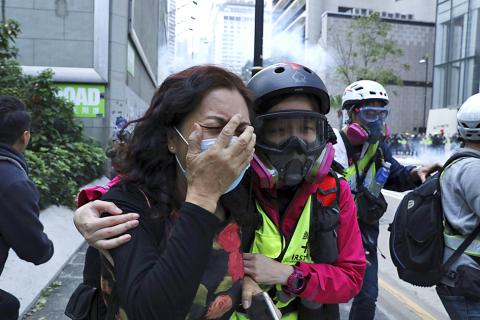Clashes yesterday broke out between protesters and police in Hong Kong, cutting short a rally after thousands had gathered at a park on Hong Kong Island to call for electoral reforms and a boycott of the Chinese Communist Party.
Police fired tear gas near Chater Garden, not far from the Legislative Council, after some protesters attacked plainclothes officers.
Sporting their movement’s trademark black clothing and masks, rally participants packed into Chater Garden, holding up signs that read “Free Hong Kong” and waved US and British flags.

Photo: AP
“We want real universal suffrage,” the protesters chanted. “Disband the police force, free Hong Kong!”
Hong Kong media outlets reported that police arrested the rally’s organizer, Ventus Lau (劉穎匡), shortly after he spoke to reporters.
Radio Television HK cited fellow organizers as saying that Lau was arrested for allegedly violating the police’s conditions for the rally.

Photo: AFP
Earlier in the day, Lau said he believes more large-scale protests are needed for global attention to return to Hong Kong, adding: “I think Hong Kong has not been the focus of the world anymore.”
He urged countries to launch sanctions against Hong Kong’s government if it does not allow residents to directly elect Legislative Council members this year.
In response to the rally, Hong Kong’s government released a statement outlining the “universal suffrage of ‘one person, one vote’ as an ultimate aim” enshrined in the territory’s Basic Law.
This step must be implemented in line with “gradual and orderly progress,” the statement said.
“The government understands the aspiration of the community for universal suffrage,” it added. “To achieve this aim, the community needs to have a clear understanding that apart from being accountable to [Hong Kong], the CE [chief executive] selected by universal suffrage is appointed by the Central People’s Government [CPG] and shall also be accountable to the CPG.”

AGING: As of last month, people aged 65 or older accounted for 20.06 percent of the total population and the number of couples who got married fell by 18,685 from 2024 Taiwan has surpassed South Korea as the country least willing to have children, with an annual crude birthrate of 4.62 per 1,000 people, Ministry of the Interior data showed yesterday. The nation was previously ranked the second-lowest country in terms of total fertility rate, or the average number of children a woman has in her lifetime. However, South Korea’s fertility rate began to recover from 2023, with total fertility rate rising from 0.72 and estimated to reach 0.82 to 0.85 by last year, and the crude birthrate projected at 6.7 per 1,000 people. Japan’s crude birthrate was projected to fall below six,

US President Donald Trump in an interview with the New York Times published on Thursday said that “it’s up to” Chinese President Xi Jinping (習近平) what China does on Taiwan, but that he would be “very unhappy” with a change in the “status quo.” “He [Xi] considers it to be a part of China, and that’s up to him what he’s going to be doing, but I’ve expressed to him that I would be very unhappy if he did that, and I don’t think he’ll do that. I hope he doesn’t do that,” Trump said. Trump made the comments in the context

SELF-DEFENSE: Tokyo has accelerated its spending goal and its defense minister said the nation needs to discuss whether it should develop nuclear-powered submarines China is ramping up objections to what it sees as Japan’s desire to acquire nuclear weapons, despite Tokyo’s longstanding renunciation of such arms, deepening another fissure in the two neighbors’ increasingly tense ties. In what appears to be a concerted effort, China’s foreign and defense ministries issued statements on Thursday condemning alleged remilitarism efforts by Tokyo. The remarks came as two of the country’s top think tanks jointly issued a 29-page report framing actions by “right-wing forces” in Japan as posing a “serious threat” to world peace. While that report did not define “right-wing forces,” the Chinese Ministry of Foreign Affairs was

PREPAREDNESS: Given the difficulty of importing ammunition during wartime, the Ministry of National Defense said it would prioritize ‘coproduction’ partnerships A newly formed unit of the Marine Corps tasked with land-based security operations has recently replaced its aging, domestically produced rifles with more advanced, US-made M4A1 rifles, a source said yesterday. The unnamed source familiar with the matter said the First Security Battalion of the Marine Corps’ Air Defense and Base Guard Group has replaced its older T65K2 rifles, which have been in service since the late 1980s, with the newly received M4A1s. The source did not say exactly when the upgrade took place or how many M4A1s were issued to the battalion. The confirmation came after Chinese-language media reported